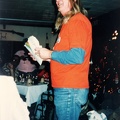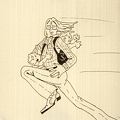[Headline] RELIGION AND THE DISABLED .. . LIBERATION THEOLOGY AND THE DISABLED MOVEMENT
by Rev. Wade Blank
In the 1950's and 1960's, as the Black communities organized for freedom, we saw many church leaders become heavily involved In the civil rights issue. The core of the civil rights movement was the Black church, and as time went on, more and more white churches joined the struggle. While the oppression of the Black communities was economic, political, and social, and the goals of the movement were integration, and equality in American society, the rationale for this work for justice was based on theological thinking. The Creator had made all people equal, and there-fore love for each other among all humanity would bring about a community of justice and liberty for all. This was the message of Rev. Martin Luther King, Jr., which so stirred the country and the world, and it was this theological basis that gave momentum to the anti-war effort during Viet Nam in the 1960's and early 1970's.
If the message of Dr. King and the church was so compelling on issues of justice and equality for people of color, then is the message not just as imperative now for the disability rights movement? Why have we not adopted the theological springboard for our civil rights movement"? There are several reasons:
1) All liberation movements evolve as people in history seek justice. This is called "salvation history" in which all humanity seeks equality and justice. This yearning that evolves into struggle is just now beginning to stir in the souls of people with disabilities.
2) People who are disabled are just now beginning to understand that the physical characteristics of disability are not more different that the fact of colored skin — a physical characteristic that locked millions of people out of society. The physical functioning, appearance, or difference should not determine if s/he receives justice and equality. In order for the disability rights movement to become powerful the disabled per-son must "own" his/her disability, as Black people own their Black skin. "This is what I am. I am proud of what I am. I need and demand what other members of my society have. The barriers erected against me in my own community are not the fault of my disability. They were built by others in their ignorance, prejudice, and paternalism." Until that perception becomes reality, we will not have the power of our own convictions to change anything!
3) Once the righteousness of our position is held in our guts — steadfast and unwavering it will begin to transmit itself to the larger society and church leadership will begin to deal with the issues. The church is getting a paternalistic message from the disability movement at this time. Church people honestly believe that all we want are ramps into churches! They don't understand that we are working for empowerment. Therefore, the liberation theology that the church applies to other oppressed groups is not realized for people with disabilities. It is up to us to make our position clear. While we are talking about access, we also demand the right to ride all public transportation, the right to keep our own children, the right to join our neighbors at the polling place, the right to an equal education, the right to eat in public places — entering through the front door with our friends and families, not around back by the garbage cans. These issues are identical to those the Black liberation movement addressed there is no difference and the church must hear that message!
American Disabled for Accessible Public Transit (ADAPT) has received substantial support from the Presbyterians, Roman Catholics, Episcopalians, and Lutherans because we have taken the time to extensively explain our issues to them. If we are to be successful in all communities, every member of the disabled community must see him/herself as a worker in a true liberation movement —steadfast and unwavering—able to triumph over every argument used against us — from "God's will!", through cost effectiveness, special treatment, architectural integrity, tradition, fear and loathing, holding firm until we, too, shall overcome.
WE WILL RIDE
NEW WORLD / MARCH 1988
- Kreita je la
- Merkredo 24 Julio 2013
- Aldonita je la
- Merkredo 9 Oktobro 2019
- Vizitoj
- 165
- Poento
- neniu taksado
- Taksu tiun foton


0 komento